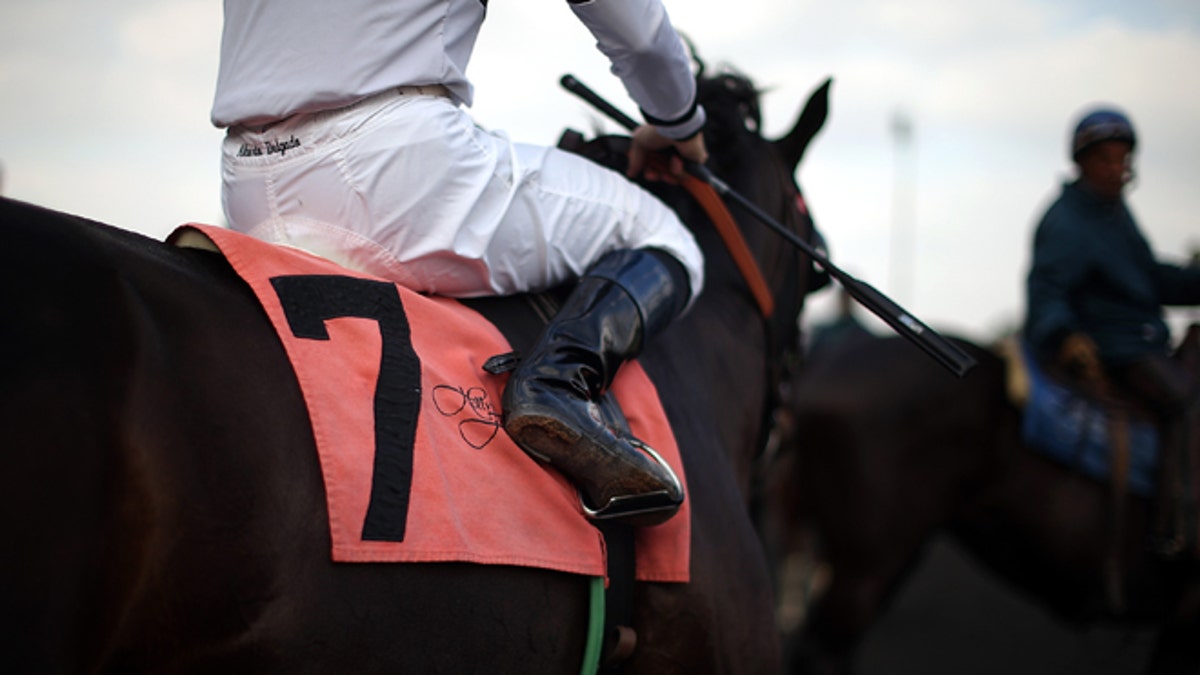
INGLEWOOD, CA - DECEMBER 21: Jockey Alberto Delgado rides onto the track before a race at Betfair Hollywood Park on December 21, 2013 in Inglewood, California. The historic Betfair Hollywood Park race track is shutting its doors after 75 years of thoroughbred horse racing with the final race running on December 22. The 260 acre plot of land is scheduled to be turned into a new retail and housing development. (Photo by Justin Sullivan/Getty Images) (2013 Getty Images)
It may not be as imposing as the famous “blue wall of silence” maintained by police officers, but jockeys have a topic that they don’t like to talk about either: making weight.
Saturday’s Kentucky Derby marks the 140th anniversary of the famous horse race held in Louisville, Kent., but only the 10th since the so-called “heaving” or “flipping” bowl was removed from the jockeys’ room at Churchill Downs.
Jeff Johnston, a retired jockey and current manager for the Jockeys Guild, the riders’ welfare association, recently described the flipping bowl as “a square porcelain bowl with a hole to flush down the vomit. They’re usually in their own cubicle at the end of a line of toilets.”
Often the bowls stand higher than a regular toilet does, to reduce the amount of kneeling jockeys have to do. In the last decade or so, some racetracks have gone to the effort of removing them, and new tracks generally don’t install them.
Of course, that may not make a tremendous difference.
Former professional jockey Darrell Haire told Fox News Latino, “Whether it’s a toilet or a heaving bowl, it’s still there.”
But few active jockeys are willing to talk about the subject. When, toward the end of his riding career, Shane Sellers participated in a 2004 HBO documentary on the subject of jockey health called "Jockey," he became something of a racetrack pariah.
Since weight guidelines for jockeys were first drawn up in the mid-nineteenth century, the average North American has increased in size by 25 to 30 percent compared to 6 percent for jockeys. That discrepancy has led to some pretty drastic attempts to “pull,” or lose, weight.
A 1995 study by the Chicago Rehabilitation Institute showed that 69 percent of all riders skipped meals, two-thirds used a “hotbox” sauna, one-third used diuretics to lose water weight and 14 percent took laxatives. Drug and diet pill abuse is rampant, according to many insiders.
And about 30 percent vomited to shed pounds.
The former jockey, Randy Romero, 57, has had kidney problems for more than a decade and now receives dialysis treatments. He has thrown up, sometimes as much as five or six times a day, since he was a 9-year-old jockey in his native Louisiana.
“The bulimia is as bad as being a cocaine addict,” he told the Cincinnati Enquirer ten years ago. “It works on your nervous system. It works on your mind.”
Weight requirements vary from race to race and track to track, but generally horses carry between 112 and 126 pounds, which includes jockey and about 7 pounds worth of gear. Some jockeys lose as much as 10 pounds in a day.
“It’s dangerous,” Haire told FNL. “Then they get weak and go out in the afternoon and race 6 to 8 times.”
Groups like the Jockeys Guild and the Winners Foundation are trying to get the minimum weight at racetracks increased by two pounds.
“These guys today are so fit — their legs and body have to be so strong,” Haire said. “Even a couple of pounds would make a world of difference.”
Other sports where weight and fitness are issues maintain a minimum of 5 percent body fat for their athletes. Less than that becomes a health risk. Many top jockeys in the U.S. have half that.
People who starve themselves for long periods of time can wind up suffering from osteoporosis, nerve damage and heart arrhythmia. Frequent vomiting can result in tooth decay, hair loss, gastrointestinal damage and, in extreme cases, kidney failure.
“People don’t realize how much these guys sacrifice for their sport,” Haire said. “I see it all the time. So many cautionary tales.”
There are organizations that offer support for jockeys, but, Haire said, “Not as much as there should be.” The Winners Foundation offers help with alcohol and drug abuse. And researchers at the University of Delaware have partnered with local jockey welfare and thoroughbred racing organizations to provide nutritional guidelines specifically for jockeys.
Haire also pointed out that Latin jockeys – a large segment of the talent pool – are at a particular disadvantage because of the language barrier. "There isn’t enough funding, and even less for outreach in Spanish,” he said.
Most of the opposition to raising the allowable weight for jockeys comes from horse trainers, who fear that added weight will harm the horses. Not to mention slow overall times.
Trainers as respected as D. Wayne Lukas have been quoted as saying things as insensitive as “Modern diets are great. Tell [jockeys] to get one. If they’re too big to make weight, they should do something else.”
Follow us on twitter.com/foxnewslatino
Like us at facebook.com/foxnewslatino
